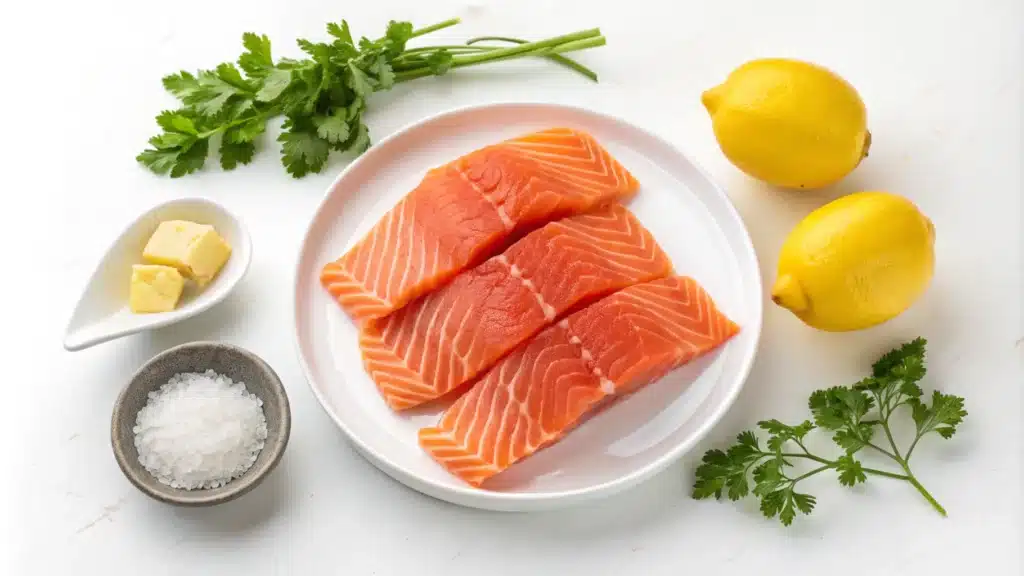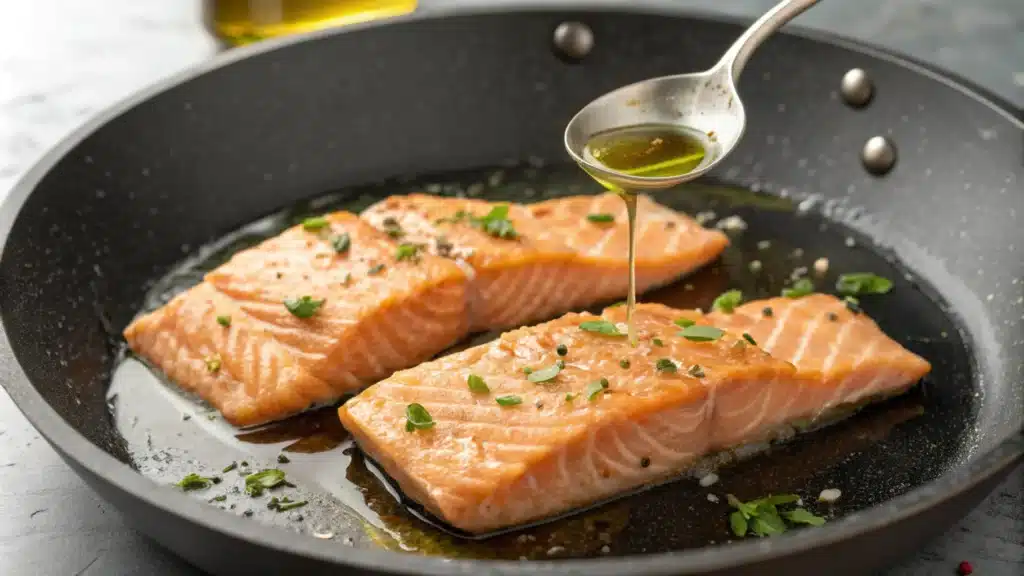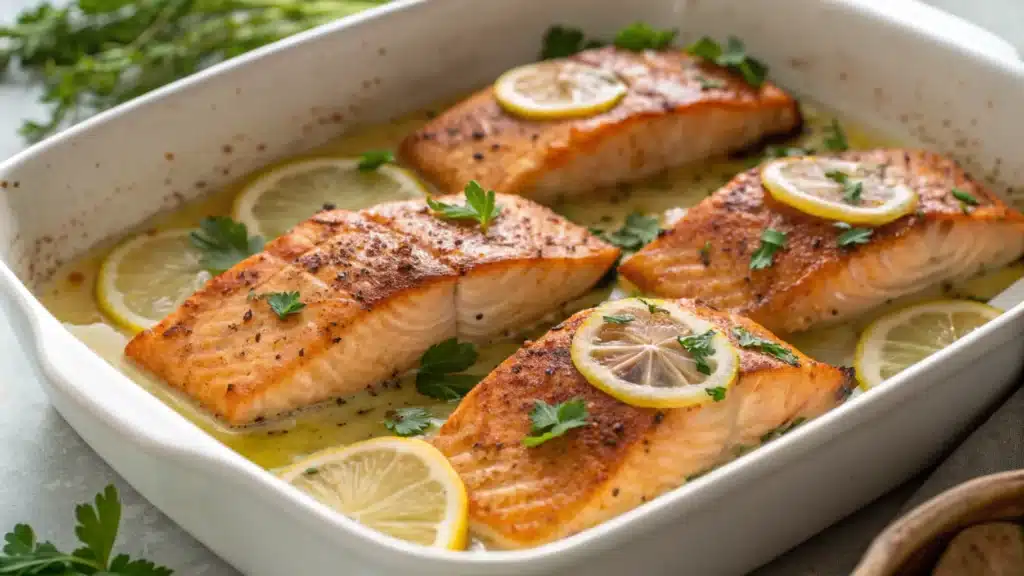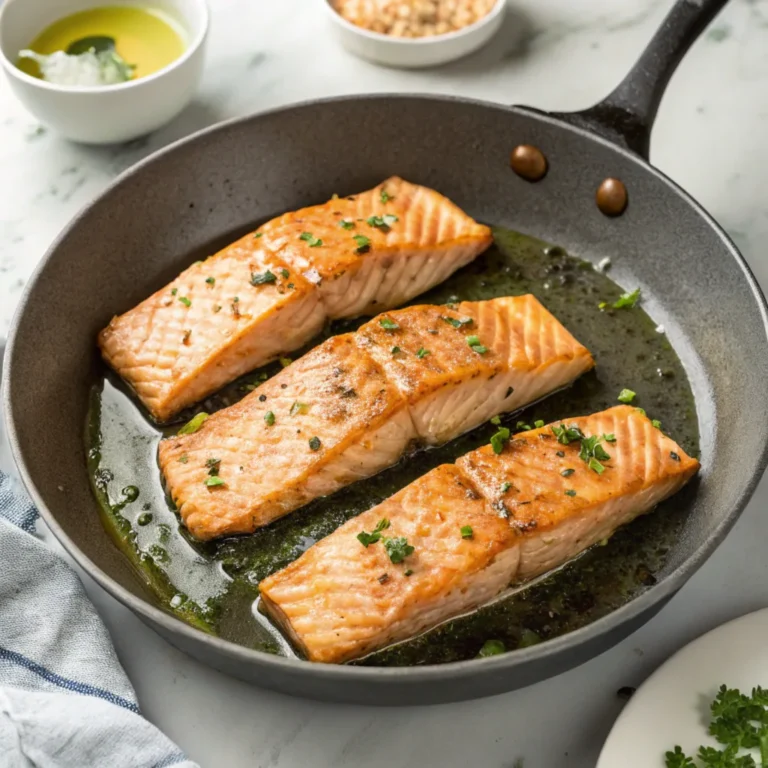Cooking salmon can feel like an art form. With its tender texture and rich taste, choosing the right fat—butter or oil—is a pivotal decision. Each option brings unique qualities to the table, influencing the flavor, texture, and health profile of your dish. This article will guide you through the differences, benefits, and best use cases for both butter and oil, helping you answer the common question: “Should I use butter or oil for salmon?”
Table of Contents
Introduction to the Butter vs. Oil Debate
Why Cooking Fats Matter for Salmon
Salmon’s natural richness makes it a versatile and flavorful fish. The fat you choose for cooking not only affects the texture but also complements the fish’s natural oils. Whether you’re grilling, searing, or baking, the fat you use can make or break your dish.
For instance, butter is often celebrated for its creamy richness, while oil is prized for its versatility and higher smoke point. But why does this choice matter? It all boils down to cooking technique, flavor profile, and even the health benefits of the fat you pick.
Overview of Butter and Oil in Cooking
Let’s break it down: butter brings a decadent richness to salmon, adding depth to dishes like a classic lemon-butter sauce. However, its low smoke point means it’s not ideal for high-heat cooking. On the other hand, oil—think olive oil or avocado oil—offers a cleaner, subtler taste and holds up well under heat, perfect for grilling or pan-searing.
In this article, we’ll discover the pros and cons of both options, discuss the science of smoke points, and share practical tips to help you make the best choice for your next salmon dish. Get ready to Promote your seafood game!
Understanding Butter’s Role in Cooking Salmon
Pros of Using Butter for Salmon
Butter is a classic choice for cooking salmon, and it’s easy to see why. It adds a rich, creamy texture that Improves the fish’s natural flavor. When you’re baking or broiling, butter helps keep the salmon moist, preventing it from drying out. It’s also a key ingredient in indulgent sauces like lemon-butter, which pairs beautifully with the fish.
Another advantage? Butter lends a golden, caramelized finish when used at moderate heat. This can make your dish more visually appealing and appetizing.

Cons of Using Butter for Salmon
Despite its benefits, butter has its downsides. Its low smoke point—around 300°F—means it burns easily, especially during high-heat cooking methods like pan-searing or grilling. Burnt butter not only creates a bitter taste but can also fill your kitchen with unwanted smoke.
Additionally, butter’s strong flavor might overpower the subtle notes of your salmon. For those who prefer the fish’s natural taste to shine, butter might not always be the ideal choice.
Best Scenarios for Butter Use
Butter works best in low-to-medium-heat preparations. Baking, broiling, and poaching allow the butter to melt slowly, infusing the salmon with flavor without burning. If you’re asking yourself, “Should I use butter or oil for salmon?” consider the dish. A creamy butter sauce may be perfect for a rich, indulgent meal, especially when paired with citrus or herbs.
Choosing Oil as an Option for Salmon
Benefits of Cooking with Oil
Oil offers versatility and stability that butter often can’t match. With a high smoke point—especially in oils like avocado or grapeseed—it’s perfect for high-heat methods like grilling or pan-searing. Oil creates a crisp, even sear on the salmon, locking in moisture and enhancing texture.
Healthy oils, like olive oil, also bring subtle, complementary flavors to your dish. They Improve the salmon’s natural taste without overpowering it, making them ideal for lighter, fresher recipes.

Downsides of Using Oil
However, oil isn’t without its drawbacks. It lacks the creaminess that butter provides, which might leave some dishes feeling less rich. Additionally, using too much oil can make the salmon feel greasy, masking its delicate flavors.
The choice of oil matters, too. Heavily processed oils can detract from the salmon’s quality, so sticking to cold-pressed or extra-virgin options is recommended.
Popular Oils for Cooking Salmon
When deciding “Should I use butter or oil for salmon?”, the type of oil matters. Olive oil is a popular choice for its heart-healthy benefits and mild taste. Avocado oil, with its neutral flavor and high smoke point, is another excellent option for searing or grilling. For a unique twist, sesame oil can add a nutty note, perfect for Asian-inspired dishes.
Experimenting with oils allows you to tailor your cooking method and flavor profile to your preferences.
Comparing Smoke Points and Cooking Methods
Importance of Smoke Point in Cooking
When cooking salmon, understanding smoke points is crucial. The smoke point is the temperature at which a fat begins to break down and produce smoke, impacting both flavor and safety. For butter, this happens at a relatively low 300°F, which means it’s not ideal for high-heat cooking methods like grilling or pan-searing. On the other hand, oils like avocado and grapeseed can withstand temperatures up to 500°F, making them a better choice for these methods.
If you’ve ever wondered, “Should I use butter or oil for salmon?”, knowing the smoke point can help you choose based on your cooking method.
High-Temperature Cooking: Oil vs. Butter
For grilling or pan-searing salmon, oils like avocado oil or extra-light olive oil are the clear winners. They provide the heat resistance needed to achieve a crisp, golden crust without burning. Butter, in these situations, might scorch quickly, leaving a bitter taste.
Lower Temperature Cooking Preferences
If you’re baking or broiling, butter is often the preferred choice. It melts gently, infusing the salmon with its creamy richness. When paired with herbs or garlic, butter can Promote the fish’s natural flavors in ways oil can’t. Consider the method you’ll use to determine the best fat for your dish.
For another salmon idea, check out this salmon bites recipe on Masterly Recipes.
Flavor Profiles and Pairings
How Butter Impacts Salmon Flavor
Butter adds a rich, decadent flavor to salmon, enhancing its natural taste. It’s particularly well-suited to dishes with bold accompaniments like garlic, lemon, or capers. The creaminess of butter creates a luxurious texture, making it a popular choice for indulgent meals.
Subtle Notes Added by Oil
In contrast, oil delivers a lighter touch, allowing the salmon’s natural flavors to shine. Olive oil, for example, offers a fruity note, while avocado oil is neutral, making it a versatile option for recipes where the focus is on the fish itself.
Choosing the Right Fat Based on Dish Ingredients
Your choice between butter and oil should also consider the ingredients in your dish. For a creamy lemon-butter sauce, butter is the natural pick. However, if you’re working with fresh herbs or spices, a drizzle of high-quality olive oil can complement the dish without overpowering it.
If you’re inspired to try more seafood dishes, discover Lemony Shrimp and Bean Stew for a fresh take on flavor
pairings.

Health Considerations
Nutritional Benefits of Oils
When it comes to health, oils often have the upper hand. Olive oil and avocado oil are rich in heart-healthy fats like omega-3s and monounsaturated fats. These can lower bad cholesterol levels while promoting overall cardiovascular health. Plus, oils tend to be lighter, making them ideal for those watching calorie intake or aiming for balanced meals.
If you’re asking yourself, “Should I use butter or oil for salmon?”, consider the nutritional value of oils, especially if you’re focusing on creating a healthy dish. Oils like grapeseed or sesame also add subtle flavor without additional saturated fats.
When Butter is a Better Choice Nutritionally
Butter, while less heart-healthy, does have its merits. It contains vitamin A and other fat-soluble vitamins that contribute to skin and eye health. Grass-fed butter, in particular, offers higher levels of omega-3s compared to regular butter. However, its higher saturated fat content means it’s best used sparingly.
Moderation Tips for Health-Conscious Cooking
For the best of both worlds, consider combining butter and oil. This reduces the amount of saturated fat while retaining butter’s creamy texture and flavor. The next time you prepare salmon, experiment with this blend to strike a balance between taste and health.
Practical Tips for Making the Choice
Tailoring Your Choice to Cooking Method
Deciding between butter and oil often depends on how you’re cooking. For high-heat methods like grilling or searing, oil is the safer option. Meanwhile, butter shines in lower-heat preparations like baking or broiling.
Matching Fats with Salmon Cuts
Thicker cuts of salmon benefit from the richness of butter, especially if baked or basted. Thinner cuts, on the other hand, pair well with lighter oils that prevent the fish from becoming overly greasy.
Testing Butter and Oil Combinations
If you’re still unsure, try combining the two. A quick drizzle of olive oil paired with a pat of butter in the pan provides the best of both worlds—high heat tolerance from the oil and creamy flavor from the butter. It’s the ultimate way to answer the question, “Should I use butter or oil for salmon?” through experimentation and personal preference.
FAQs
What’s the Best Fat for Pan-Searing Salmon?
When pan-searing salmon, oil is the top choice. With its higher smoke point, oils like avocado or light olive oil can handle the high heat needed to achieve a crisp, golden crust. Butter, while flavorful, burns too easily for this method. If you’re pondering, “Should I use butter or oil for salmon?”, stick with oil for searing perfection.
Can I Use Both Butter and Oil Together?
Absolutely! Combining butter and oil allows you to enjoy the best of both. The oil prevents the butter from burning, while the butter adds richness and flavor. This method works particularly well for pan-searing, where the butter can Improve the taste without compromising the dish.
Is Olive Oil Better Than Avocado Oil for Salmon?
Both oils are excellent for salmon, but they serve different purposes. Olive oil adds a fruity note, while avocado oil is neutral and more heat-tolerant. Choose based on your cooking method and flavor preferences.
Combining Butter and Oil for the Ultimate Salmon Dish
Why Combine Butter and Oil?
If you’re torn between butter’s richness and oil’s high-heat resilience, why not use both? By combining these fats, you can achieve a perfectly cooked salmon that’s both flavorful and well-textured. The oil prevents the butter from burning, while the butter adds its signature creamy taste.
How to Combine Butter and Oil for Salmon
Start by heating a small amount of oil, like olive or avocado oil, in a pan over medium-high heat. Once the pan is hot, add a pat of butter, letting it melt gently. The oil raises the overall smoke point, so you can sear or cook at higher temperatures without worrying about scorching the butter.
Using this method Secures a golden, crispy crust on the salmon while maintaining its moist, tender interior. For a flawless finish, drizzle any remaining melted butter-oil mixture over the cooked fish!
Conclusion and Recommendations
Recap of Key Points
Deciding between butter and oil for salmon depends on your cooking method, flavor goals, and health considerations. Butter brings richness and creaminess, making it ideal for lower-heat methods like baking or broiling. Oil, on the other hand, offers versatility and high-heat stability, perfect for grilling or pan-searing.
Final Suggestions for Home Cooks
If you’re still debating, “Should I use butter or oil for salmon?”, why not try both? Use oil for the base of your cooking to prevent burning, then finish with a touch of butter for added flavor. This approach combines the strengths of each fat, ensuring a balanced and delicious dish.
Experimenting with different oils and techniques will help you discover your personal preference. Whether you’re aiming for a light, fresh meal or a rich, indulgent dish, the right fat can make all the difference in your salmon cooking adventures!

